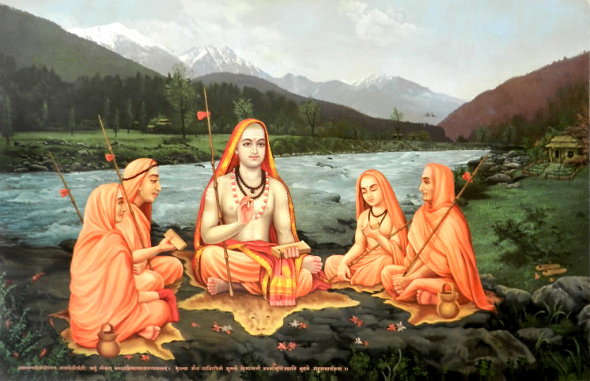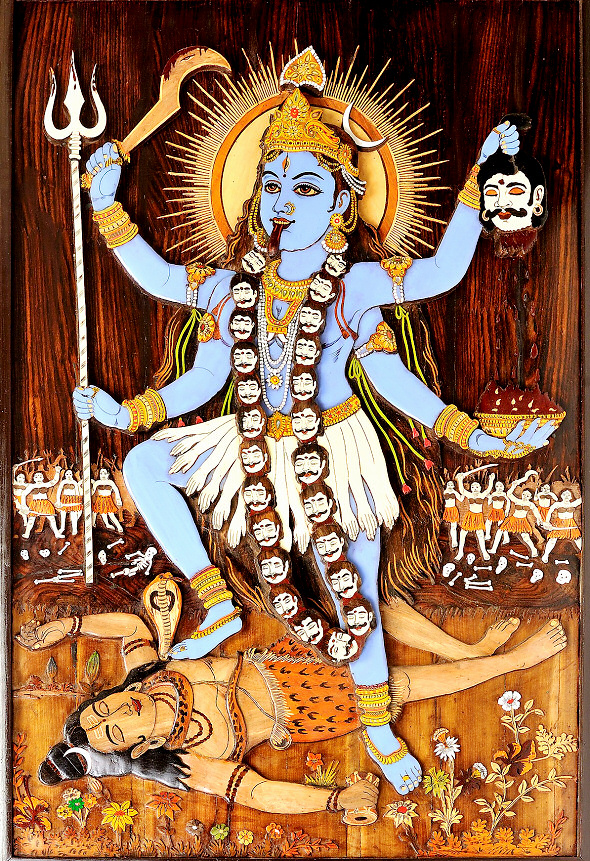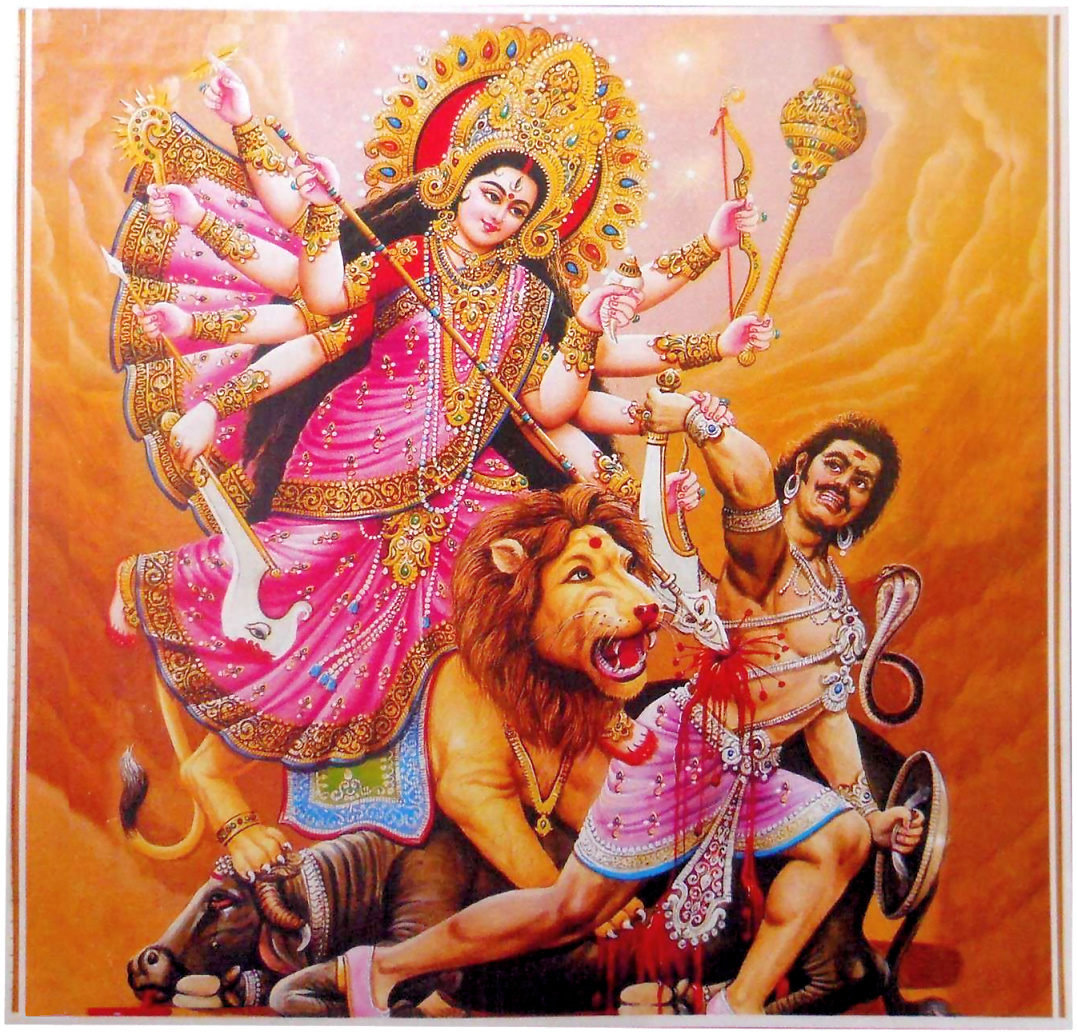Lord Śiva is described as being accompanied by dangerous
potencies (śaktyā ghorayā), and that is the actual position of Lord Śiva
Lord Śiva, the most powerful demigod, second only to Lord Viṣṇu, is self-sufficient. Although he has nothing to aspire for in the material world, for the benefit of those in the material world he is always busily engaged everywhere and is accompanied by his dangerous energies like goddess Kālī and goddess Durgā.
Lord Śiva is known as the greatest devotee of the Supreme Personality of Godhead. He is known as the best of all types of Vaiṣṇavas (vaiṣṇavānāṁ yathā śambhuḥ). Consequently, Lord Śiva has a Vaiṣṇava sampradāya, the disciplic succession known as the Rudra-sampradāya. Just as there is a Brahma-sampradāya coming directly from Lord Brahmā, the Rudra-sampradāya comes directly from Lord Śiva. Lord Śiva is one of the twelve great personalities, as stated in Śrīmad-Bhāgavatam (6.3.20):
svayambhūr nāradaḥ śambhuḥ – kumāraḥ kapilo manuḥ
prahlādo janako bhīṣmo – balir vaiyāsakir vayam
These are twelve great authorities in preaching God consciousness. The name Śambhu means Lord Śiva. His disciplic succession is also known as the Viṣṇusvāmi-sampradāya, and the current Viṣṇusvāmi-sampradāya is also known as the Vallabha-sampradāya. The current Brahma-sampradāya is known as the Madhva-Gauḍīya-sampradāya.

Śrīpāda Śaṅkarācārya’s last instruction:
bhaja govindaṁ bhaja govindaṁ bhaja govindaṁ mūḍha-mate
Worship Govinda, worship Govinda, worship Govinda, O fool!
Rules of Grammar will not save you at the time of your death.
Other than chanting the Lord’s names, there is
no other way to cross the life’s ocean.
Even though Lord Śiva appeared to preach Māyāvāda philosophy, at the end of his pastime in the form of Śaṅkarācārya, he preached the Vaiṣṇava philosophy: bhaja govindaṁ bhaja govindaṁ bhaja govindaṁ mūḍha-mate. He stressed worshiping Lord Kṛṣṇa, or Govinda, three times in this verse and especially warned his followers that they could not possibly achieve deliverance, or mukti, simply by word jugglery and grammatical puzzles. If one is actually serious to attain mukti, he must worship Lord Kṛṣṇa. That is Śrīpāda Śaṅkarācārya’s last instruction.
Herein it is mentioned that Lord Śiva is always accompanied by his material energy (śaktyā ghorayā). Material energy—goddess Durgā, or goddess Kālī—is always under his control. Goddess Kālī and Durgā serve him by killing all the asuras, or demons. Sometimes Kālī becomes so infuriated that she indiscriminately kills all kinds of asuras. There is a popular picture of goddess Kālī in which she wears a garland composed of the heads of the asuras and holds in her left hand a captured head and in her right hand a great khaḍga, or chopper, for killing asuras. Great wars are symbolic representations of Kālī’s devastation of the asuras and are actually conducted by the goddess Kālī.
sṛṣṭi-sthiti-pralaya-sādhana-śaktir ekā
chāyeva yasya bhuvanāni bibharti durgā
(Brahma-saṁhitā 5.44)
The external potency Māyā who is of the nature of the shadow of the cit potency, is worshiped by all people as Durgā, the creating, preserving and destroying agency of this mundane world. I adore the primeval Lord Govinda in accordance with whose will Durgā conducts herself.
Purport: Durgā is ten-armed, representing the tenfold fruitive activities. She rides on the lion, representing her heroic prowess. She tramples down Mahīṣāsura, representing the subduer of vices. She is the mother of two sons, Kārttikeya and Gaṇeśa, representing beauty and success. She is placed between Lakṣmī and Sarasvatī, representing mundane opulence and mundane knowledge. She is armed with the twenty weapons, representing the various pious activities enjoined by the Vedas for suppression of vices. She holds the snake, representing the beauty of destructive time. Such is Durgā possessing all these manifold forms. Durgā is possessed of durga, which means a prison house. When jīvas begotten of the marginal potency (taṭasthā śakti) forget the service of Kṛṣṇa they are confined in the mundane prison house, the citadel of Durgā. The wheel of karma is the instrument of punishment at this place. The work of purifying these penalized jīvas is the duty devolved upon Durgā. She is incessantly engaged in discharging the same by the will of Govinda.
Durga is not different from yogamaya” or “Maya is like a shadow of the Supreme Personality of Godhead” or “The entire cosmos is created by Durga in cooperation with Lord Visnu in the form of kala, time” or “chayeva yasya bhuvanani bibharti durga” or “icchanurupam api yasya ca cestate sa” or “srsti-sthiti-pralaya-sadhana-saktir eka”
Durgā, worshiped by the people of this mundane world, is the Durgā described above. But the spiritual Durgā, mentioned in the mantra which is the outer covering of the spiritual realm of the Supreme Lord, is the eternal maidservant of Kṛṣṇa and is, therefore, the transcendental reality whose shadow, the Durgā of this world, functions in this mundane world as her maidservant. (Vide the purport of BS śloka 3.)
Asuras try to pacify the goddess Kālī, or Durgā, by worshiping her in material opulence, but when the asuras become too intolerable, goddess Kālī does not discriminate in killing them wholesale. Asuras do not know the secret of the energy of Lord Śiva, and they prefer to worship goddess Kālī or Durgā or Lord Śiva for material benefit. Due to their demoniac character, they are reluctant to surrender to Lord Kṛṣṇa, as indicated by Bhagavad-gītā (7.15):
na māṁ duṣkṛtino mūḍhāḥ – prapadyante narādhamāḥ
māyayāpahṛta-jnānā – āsuraṁ bhāvam āśritāḥ
Lord Śiva’s duty is very dangerous because he has to employ the energy of goddess Kālī (or Durgā). In another popular picture the goddess Kālī is sometimes seen standing on the prostrate body of Lord Śiva, which indicates that sometimes Lord Śiva has to fall down flat in order to stop goddess Kālī from killing the asuras. Since Lord Śiva controls the great material energy (goddess Durgā), worshipers of Lord Śiva attain very opulent positions within this material world.

Great wars are symbolic representations of Kālī’s devastation
of the asuras and are actually conducted by the goddess Kālī
Under Lord Śiva’s direction, a worshiper of Lord Śiva gets all kinds of material facilities. In contrast, a Vaiṣṇava, or worshiper of Lord Viṣṇu, gradually becomes poorer in material possessions because Lord Viṣṇu does not trick His devotees into becoming materially entangled by possessions. Lord Viṣṇu gives His devotees intelligence from within, as stated in Bhagavad-gītā (10.10):
teṣāṁ satata-yuktānāṁ – bhajatāṁ prīti-pūrvakam
dadāmi buddhi-yogaṁ taṁ – yena mām upayānti te
“To those who are constantly devoted and worship Me with love, I give the understanding by which they can come to Me.”
Thus Lord Viṣṇu gives intelligence to His devotee so that the devotee can make progress on the path back home, back to Godhead. Since a devotee has nothing to do with any kind of material possession, he does not come under the control of goddess Kālī, or the goddess Durgā.
Lord Śiva is also in charge of the tamo-guṇa, or the mode of ignorance in this material world. His potency, the goddess Durgā, is described as keeping all living entities in the darkness of ignorance (yā devī sarva-bhūteṣu nidra-rūpaṁ saṁsthitā). Both Lord Brahmā and Lord Śiva are incarnations of Lord Viṣṇu, but Lord Brahmā is in charge of the creation whereas Lord Śiva is in charge of the destruction, which he carries out with the help of his material energy, goddess Kālī, or goddess Durgā.
Thus in this verse Lord Śiva is described as being accompanied by dangerous potencies (śaktyā ghorayā), and that is the actual position of Lord Śiva.
Compiled by Mohini Devi, from:
Srimad Bhagavatam, Canto Four, Chapter Twenty-four
Chanting the Song Sung by Lord Śiva, Text 18









Pamho agtacbsp,in this material world is more to become a servant of SIVA SANKAR BHAGAVAN then a servant of SRI KRSNA because SRI ASUTOSH is very satisfying more easily then SRI KRSNA,there are many stories about SIVA AS A SIVA TATTVA where HE awards mukti liberation and even prem puman artho mahan let me for KRSNA to HIS followers because is half VISNU TATTVA and half SIVA TATTVA HE is not a jiva tattvam otherwise HE could not deliver HIS devotees to SRI KRSNA both siva and HIS eternal wife are the adhi yogi and yogini therefore they are not ordinary people.all glories to SIVA SANKAR BHAGAVAN .VRINDAVANAVANI PATE JAYA SOMA SOMA MULE…
GOPESVARA VRAJA VILASI YUGMANGHRI PADME PREMA PRAYACCHA NIRUPADHI NAMO NAMASTE (.SANKALPA KALPA DRUMA 103) AGTACBSP YS HARIBOL